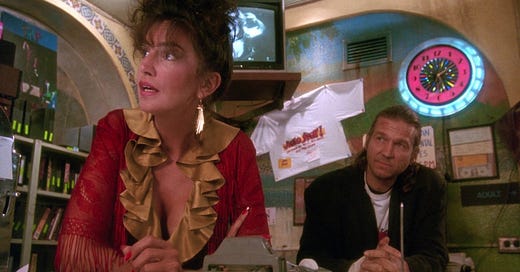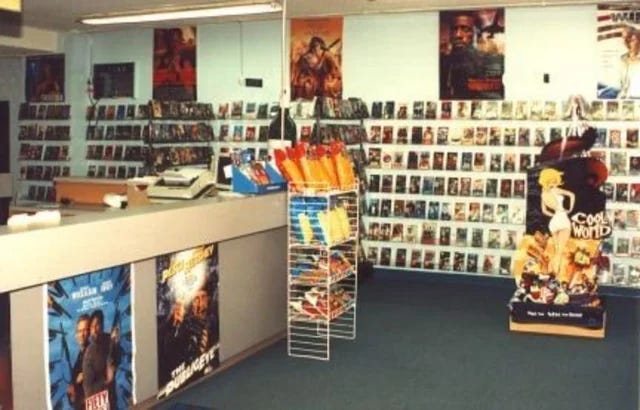
I Could Use A Video Rental Store Right About Now
Less streaming and human interaction. What a concept!
I’m pretty sure I’ve never been through Symsonia, Kentucky. I could be wrong about that since I’ve driven through the Bluegrass State a few times, but the whole “one-stoplight town” of 500 people makes me think I wouldn’t have even noticed it if I’d been there. But Derek Operle recently wrote something for the local NPR affiliate about Symsonia Video that has me wondering if the little Graves County burg might be ahead of the curve even though the video rental shop is one of the last of its kind in all of KY.
Carol Turner owns the shop. She’s been running it for 35 years and told Operle it used to take two people to run things. These days Turner “does everything at the shop. She stocks the movies, rewinds the tapes, works the counter and connects with her customers, though she says she misses a lot of her old regulars who’ve stopped coming in recent years.” The likelihood of somebody stepping in to fill her shoes whenever she decides to stop recirculating the DVDs and VHS tapes back onto the shelves seem pretty slim since being a small town video rental shop isn’t exactly lucrative, and that’s a shame since it feels like now would be the exact right time to be in the business of renting physical media out to people.
That probably sounds like the dumbest thing I’ve ever typed for The Melt as Netflix’s stock marches towards the thousand dollar-per-share mark, but the rise in value comes alongside the announcement of another subscription price hike. That means I cut the cable cord a few years back because it saved me money back then, but now I’m going to pay $17.99 for ad free Netflix, however much I pay for that Disney+ bundle that includes Hulu, the Peacock subscription, Prime, and whatever we pay to rent streaming movies. I should probably get out a calculator since it sounds like I’m spending a lot of money for what I used to think was the cheaper, better way to watch stuff. What’s worse is how disappointed I find myself with the experience most of the time. Between the low-quality of so much of the stuff that’s tossed onto streaming platforms, the amount of stuff that’s simply gotten rid of because it saves the company a little money, and the paltry amount of older films offered up by some of the bigger services, hardly a night goes by when I don’t think of just tossing my TV out the window, finding the nearest Salvation Army and just buying an old Sony Trinitron with a built-in VHS player.
There are streaming services I love—obviously Criterion Channel is a must, and it’s great seeing what Metrograph has been building on their site—but a big reason those appeal to me is because they’re curated. I could watch a movie for the first or the third time on Criterion, and there’s a pretty good chance I’ll appreciate it more than I would if I dialed it up on Hulu or Netflix because there’s a reason it’s streaming on the Collection’s site, and it’s presented appropriately. But if I had a video place nearby, I’d walk in there and rent at least two movies a week. I’d do it because I like supporting small businesses and because the quality is usually better than anything I can get on Prime or Hulu, but also because I just miss the experience of renting movies.
Like probably everything else I complain about, there’s probably a hint of nostalgia in my longing for a place to go rent DVDs from. I don’t long to get off the grid, but I’d be happy cutting the algorithm out of my life if I could. Most of my watch recommendations come from friends or writers whose opinions I trust, but so much of the foundation of my love for movies was laid by the people who worked at video stores and spent most of their free time watching what they were slinging. Between bookstores, record shops, and video rental places, I’d say the movie buffs were often the surliest, but they were also the ones I learned the most from. This goes against the modern talk of admonishing people for being so-called “gatekeepers” of culture, but I believe that in order to really appreciate any sort of art, you need to go through sort of a bootcamp process. Nothing should stand in the way of you enjoying or appreciating a book or painting, but I’m a firm believer that we could all use a little hardening up when it comes to cultural intake. Being forced to really think whether you want to risk embarrassment by asking somebody if they carry a certain film or record in the shop goes a long way in learning to appreciate things.
There’s are also some pragmatic reasons why I could see video stores making a comeback. The easy one I could point to is vinyl. Remember when tapes replaced LPs, and then eventually CDs came out and killed everything that had come before it? We got rid of all our cassettes so we could lug around black books filled with sleeve after sleeve of those little plastic discs that could be rendered unplayable by even the slightest scratch, then we eventually tossed out our CDs when everything was available on Spotify or Apple Music. Meanwhile, every year you can read a dozen articles about the vinyl record “comeback” that’s been going on for years now. Since 2016, vinyl sales have risen nearly 300 percent, with over 200 million new (that’s not counting the thriving LP market that stretches from dealers and shops to the stuff you can find at thrift stores) records being sold. It's sort of a similar thing with books, magazines or any physical media written off as dead: there will always be an audience for things people can actually hold, but it won’t be everybody. The amount of homes that actually have record players is probably quite small, there’s less clutter when you stick to digital magazine subscriptions, and the connivence of modern culture is what many people long for. I’m not saying you should throw it all away and open up a store that rents and sells videos in your city or town, but I do think there’s enough people out there who want places like that and who’d support them. I’ve had a few friends from L.A. kvetch about the lack of repertory movie houses in comparison to NYC, but I'll just look at them and say, “Well, sure. But you have Vidiots.” Similarly, Videodrome in Atlanta is one of the top five things along with Outkast, Donald Glover’s show, The Varsity, and Dominique Wilkins that I think of when the city is mentioned. If those places can keep going, I’m sure every city could have at least one place for people who really want to watch the Blu-ray version of some movie from the mid-1970s on their sweet setup or who truly like the look and feel of horror films from the ‘80s on VHS tape.
The simple answer is that you can just go to the library and it’s free to take out DVDs there—and yes, that’s true. But the curation thing is omitted from the experience, and then there’s the whole awful thing about how libraries often come under attack from censorship goons who think that if a kid reads The Diary of Anne Frank or a Toni Morrison novel that they’re going to suddenly decide they’re a transgender socialist who believes women should be able to get abortions and they won’t get into heaven. If they’re coming for books, librarians, and libraries now, I’m guessing they won’t have much issue going after movies that anybody can rent for free with a library card.
Whether it’s the streaming services or the dummies who claim to be “protecting the children,” somebody is always looking to take away your opportunities to experience culture. We shouldn’t let the dummies win, and more brick and mortar places that sell and rent vides would serve as a small, but effective way of fighting back against the schmucks.












I live about 2 hours east of this town in KY and had no idea it existed. I thought after Family Video closed they are were all gone in my state.
Make it a point to browse Movie Madness in Portland whenever you’re next in the region!